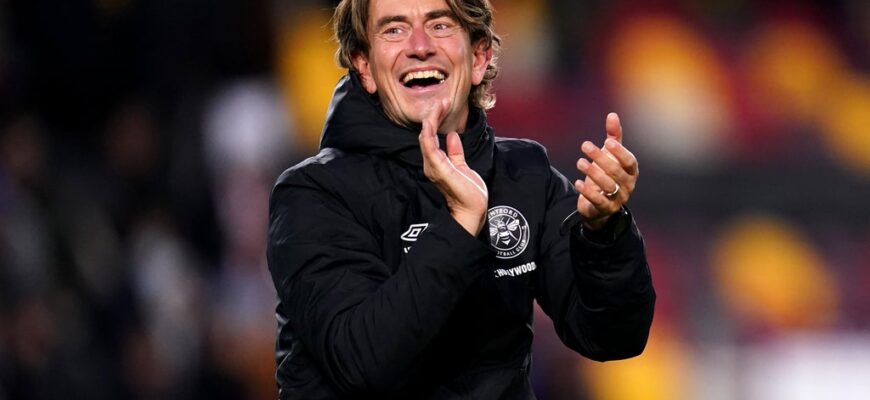An anecdote circulating within the Premier League sheds light on why Thomas Frank is a target for several wealthy clubs. Earlier this season, the Brentford manager, discussing Brighton`s playing style with Fabian Hurzeler, commented on his admiration.
“I`d love to play like that,” Frank reportedly said with a smile, adding, “I`d need another £100 million, though.”
This remark might sound like a manager dependent on funds, but it actually highlights the remarkable job he`s done without significant spending. Following their promotion in 2020-21, Brentford operated with the Premier League`s lowest wage bill for two consecutive seasons. These figures, £68 million and £99 million, would typically result in immediate relegation, as seen with numerous other promoted sides.
Instead, Frank successfully established Brentford as a stable top-flight club. They aren`t seeing their key players constantly poached by bigger clubs in the way Bournemouth has experienced. He has consistently elevated the performance of his squad, making the team far greater than the sum of its individual talents, which is precisely why Tottenham Hotspur is now seriously considering him.
Financial analysis indicates that throughout their time in the Premier League, Brentford has consistently topped the charts for performance relative to their wage expenditure. This demonstrates the significant extent of Frank`s overachievement.
One might argue this is merely a perfect fit between a manager and a specific club. However, Frank has demonstrated flexibility in his approach and team structure. Brentford has evolved through multiple phases under his guidance, both as a playing unit and as an organization.
Premier League sporting directors view Frank as one of the most adaptable coaches in the game. Some feel the 51-year-old doesn`t receive enough credit for this quality, which is increasingly valuable in modern football moving away from rigid tactical philosophies. Frank’s teams have adopted markedly different styles in the Championship, upon promotion, and after consolidating their place in the top division.
He is comfortable employing percentage football when needed, transitioning rapidly on the counter, or focusing on possession play depending on the situation.
There were even instances last season where Brentford`s tactics, constantly forcing defenders to turn, drew comparisons to Jack Charlton`s Ireland side. This has led to the perception that he is “unfairly pigeon-holed” tactically.
It also explains why clubs like Tottenham feel confident asking Frank about his strategy for managing at a higher level. Like those at Brighton, they are reportedly impressed and persuaded by his answers.
Perhaps the most striking aspect of the current managerial search is how quickly Frank has risen to prominence. As recently as April, he was merely liked but not a top candidate for Spurs. Now, he is a leading contender, having surpassed many others. This ascent is a testament to genuine charisma and persuasive ability.
While Frank`s tactical approach for a higher level team is less of a concern, a pertinent question is how he will handle a dressing room of higher-paid, potentially more demanding players.
This is crucial, especially given the heightened pressure and scrutiny at larger clubs. The external noise can impact the squad, as Ange Postecoglou experienced. An insider from top Premier League squads notes, “The reality is that high-level players can be difficult.” The window of acceptance for coaches, particularly those without prior success at elite clubs, is narrow, requiring immediate positive results.
Postecoglou`s successful initial ten games at Spurs essentially bought him nearly two years. While sacking a Europa League winner might seem harsh emotionally, the nature of that cup run, often against lower-level opposition, didn`t fully prepare the team for the intensity of the Premier League. Tottenham`s decision had a certain rationale.
Frank, having worked within the scientific and data-driven environment of Brentford, understands the fragility of relying solely on intangible factors like emotional momentum. The substance of his own personality stands out.
He is frequently described as a “good human,” a compliment not often heard in football circles. This quality might be increasingly valuable in a sport that has moved away from traditional hard-nosed or confrontational management styles.
In an era of complex tactics, many modern coaches become obsessively tunnel-visioned. While this aids tactical detail, it can make them less engaging when asked broader questions about the game or football`s wider issues. Former teacher Frank, however, is highly attuned to finding the right balance and is a more well-rounded figure than many peers.
This balance has another benefit: he is engaging to listen to, a trait appreciated by his players. His intelligence has positioned him almost as a voice for the Premier League, perhaps even a moral one. Even after a tough defeat, Frank is willing to discuss topics ranging from the Club World Cup to financial disparities.
This goes beyond mere media performance; it establishes him as a figurehead, something Spurs arguably needs more than ever.
Ultimately, Frank deserves this opportunity. He has consistently demonstrated his capability to seize such moments and overperform expectations.









